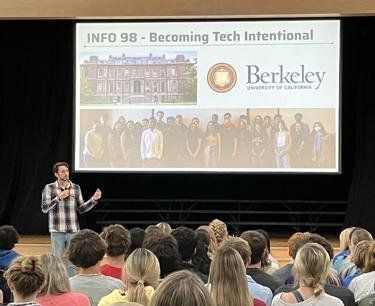Watch: Joyful 18-month-old toddler learns how to do the Māori haka dance
"The world has never needed the haka more than it does now."

This toddler learning haka dance is taking over the Internet.
The haka is a Māori tradition that originated as a war dance. In recent years, people around the world have come to know and love the passionate performance. The emphatic, rhythmic gestures, wide eyes, and chanted words grace screens across multiple countries on a near daily basis, often bringing viewers to tears.
Having a window into such a rich culture can make people curious on how cultural traditions like the haka are passed down. Surely Māori babies aren't born knowing this dance instinctively, nor is there a magic switch that flips when they reach a certain age. One family gave a little glimpse into how the culture is passed down from one generation to the next and it's beyond adorable.
In late 2024, New Zealand wife and mum Hope Lawrence uploaded a video of her 18-month-old practicing the haka with his dad in the dining room, and the little guy is surprisingly good. In the video, the baby starts off with a stomp and grunt as his dad shows him the wero, which is the trembling hand often seen in the dance. As the dad walks back and forth starting the chant along with wero, the little one tries his best to mimic his dad.
Before too long the toddler is chanting along and copying the dad's moves almost exactly, even if you can't quite make out what the little guy is saying, his haka is still powerful. This isn't the first time the baby has been caught doing the haka. Just a month before the adorable video, he was caught practicing his haka along with the New Zealand rugby team All Blacks on the family television. His tiny haka moves have taken social media by storm with over 53 million views, 7.1 million likes, and more than 53K comments.
@hopeylawrence Teach them the way young 😍 Keep our culture going #haka #maoritok #fyp #hakawithdad #maori #aotearoa #newzealand #maoritiktok #culture #pukana #kamate #parliament #toitutetiriti #dad #standtall #tamariki
People cannot get enough of his powerful little dance, with one person writing, "The Haka is so powerful but seeing this father teaching his baby is so much powerful. I am deeply moved."
Another person thinks the dance is just the light people need to see right now, saying, "The world has never needed the haka more than it does now."
Someone else noticed the confidence exuding from the toddler, noting, "The way y'all were in complete cadence together with the leg slap... he came in with confidence because of you, and y'all nailed it perfectly together."
@hopeylawrence Our little haka obsessed boy practicing his Kia Rite 😍 😍 #pov #hakapractice #haka #nzhaka #fyp #pukana #viral #kiarite #maori #NZ #nztiktok #aus #nzmaori #allblacks #newzealandallblacks #haka #hakaleader
One viewer appreciates the peek into another culture, saying, "I LOVE THIS!!! if it wasn't for tik tok I would've never been exposed to Māori culture. can't tell you how many Haka performances I've watched. they make me feel so empowered."
Appreciation of culture being passed down is a common theme among commenters with one saying, "This is truly beautiful to watch, not just because the father is keeping interaction and culture with child, but it's keeping a beautiful culture present... some other cultures didn't have this."
@hopeylawrence The haka is on repeatt😅 #haka #babyhaka #maoritok #maori #culture #hakatime #fyp #toitutetiriti #aotearoa #pukana #viral 📸 credit:@Zealan_lawrence
Many people who watch the haka have a deeply emotional reaction they can't explain even though they have no personal connection to the culture. The dance seems to speak to a part of humans that may be missing their ancestral connections, possibly awakening some dormant longing. There's no real way to know for sure, but the amount of people who report being brought to tears every time the dance is performed is significant. This baby will surely keep his culture alive as he grows into adulthood, likely teaching his own child as his father taught him.
This article originally appeared last year.


 Joyful moments captured: A cheerful day out!
Joyful moments captured: A cheerful day out! Two generations connecting through their smartphones.
Two generations connecting through their smartphones. Elderly man working.
Elderly man working. A woman in a shower cap.Canva Photos
A woman in a shower cap.Canva Photos A healthy coat of dirt.
A healthy coat of dirt. Maybe cool it on the hot showers. Canva Photos.
Maybe cool it on the hot showers. Canva Photos. An 18-year-olds remaining time, in months.via TEDx
An 18-year-olds remaining time, in months.via TEDx Dino Ambrosi speaks at a school assembly.via Dino Ambrosi (used with permission)
Dino Ambrosi speaks at a school assembly.via Dino Ambrosi (used with permission) A teen boy looks at his phone in bed.via
A teen boy looks at his phone in bed.via